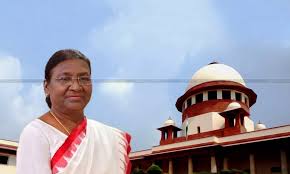President Droupadi Murmu Seeks Supreme Court’s Opinion on Governor’s Powers, Raises 14 Constitutional Questions Under Article 143
In a significant constitutional development, President Droupadi Murmu has formally referred 14 crucial legal questions to the Supreme Court of India, invoking Article 143(1) of the Constitution.
The reference follows the apex court’s April 8 judgment, which laid down timelines for governors and the President to act on bills passed by state legislatures, and placed clear limitations on the discretion of governors in such matters.
This marks a rare use of Article 143(1), which empowers the President to consult the Supreme Court on legal matters of public importance.
The provision states that the President may refer to the Court any question of law or fact if it appears to be of such a nature and importance that obtaining the Court’s opinion is expedient.
Backdrop: April 8 Supreme Court Ruling
The Supreme Court had recently ruled that governors must act within a reasonable time on bills passed by the state assemblies under Article 200 and cannot withhold or delay assent indefinitely.
The verdict also clarified that governors do not have discretion in this regard and must comply with the advice of the elected Council of Ministers.
Additionally, the Court held that state governments can directly approach the Supreme Court if the President withholds assent to a bill reserved by a governor.
The ruling sparked a major debate on the interpretation of constitutional roles and checks between state governments, governors, and the Union government.
President’s Questions to the Supreme Court
In light of this ruling, President Murmu has requested the Supreme Court’s authoritative interpretation on several key constitutional questions.
These include the scope of gubernatorial powers, the justiciability of those powers, and the limits of judicial intervention. The 14 questions are:
- What constitutional options are available to a governor under Article 200 when a bill passed by a state legislature is presented to them?
- Is the governor obligated to act solely on the advice of the Council of Ministers when exercising the options under Article 200?
- Can the exercise of discretion by a governor under Article 200 be subjected to judicial review?
- Does Article 361, which grants immunity to the President and governors from court proceedings, constitute a complete bar to judicial scrutiny of a governor’s actions under Article 200?
- In the absence of an explicit constitutional timeframe, can courts impose deadlines or prescribe how a governor should act under Article 200?
- Similarly, can the President’s discretionary power under Article 201 be subjected to judicial review?
- In the absence of constitutional guidance, can courts impose timelines for the President’s decision-making under Article 201?
- When a governor reserves a bill for the President, is the President required to seek the Supreme Court’s opinion under Article 143 before making a decision?
- Are the decisions made under Article 200 (by the governor) and Article 201 (by the President) open to judicial scrutiny before the bill becomes law?
- Can courts examine or rule on the contents of a bill before it has received assent and become law?
- Can the courts override or substitute decisions made by the President or governor using their powers under Article 142?
- Is a bill passed by a state legislature considered a law in force if the governor has not granted assent under Article 200?
- Given Article 145(3), which mandates that substantial constitutional questions must be heard by a Constitution Bench of at least five judges, is it not necessary for the Court to first determine if such a referral is required?
- Do the powers under Article 142 extend to issuing directions or orders that contradict existing constitutional or statutory provisions, or are they confined to procedural matters only?
- Is Article 131—which allows for original jurisdiction in disputes between states and the Union—the only route for resolving such inter-governmental conflicts, or can other mechanisms be used?
Government and Political Reactions
The April 8 ruling had provoked reactions from several political and legal quarters.
The Supreme Court, in its judgment, criticized governors for reserving bills based on “personal dissatisfaction, political reasons, or extraneous considerations”, calling such behavior constitutionally impermissible.
A bench comprising Justices J.B. Pardiwala and R. Mahadevan had emphasized that such actions, if proven, would be liable to be quashed immediately.
Significance of the Presidential Reference
This Presidential reference comes at a critical moment when Centre-state relations and the role of governors are being intensely debated.
The Supreme Court’s eventual response to these 14 questions will not only clarify the boundaries of judicial power and executive discretion but may also reshape the dynamics of federal governance in India.
The case is expected to be heard by a Constitution Bench, given the nature of the constitutional interpretation involved.

